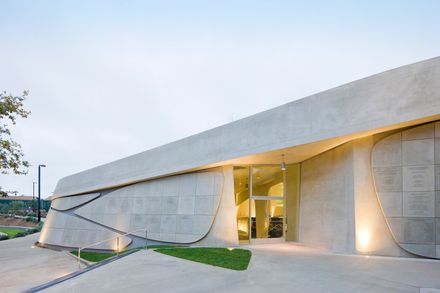
Los Angeles Museum Of The Holocaust
ARCHITECTS
Belzberg Architects
ARCHITECT IN CHARGE
Hagy Belzberg
LOCATION
Los Angeles, United States
CATEGORY
Museum
AREA
27000.0 m²
YEAR
2010
PHOTOGRAPHS
Iwan Baan , Benny Chan, Jac Currie
ENVIRONMENTAL ENGINEER
Enviropro, Inc.
MANUFACTURERS
Terrazzo & Marble, Timely Industries, HAWS, Von Duprin, Bartco Lighting, Viracon, SLOAN, Prudential Lighting, ASSA ABLOY, Antares Enterprises, Clark Pacific, Signify, American Standard, Armstrong Ceilings, Bega, Fry Reglet, Schindler, Bobrick, Montel, C.R. Laurence, Carrier + 34
PROJECT MANAGER
Aaron Leppanen
STRUCTURAL
William Koh & Associates
CONTRACTOR
Winters-Schram
MECHANICAL
John Dorius & Associates
METHANE ENGINEER
Carlin Environmental
ELECTRICAL
A&F Consulting Engineers
DESIGN TEAM
Andrew Atwood, Barry Gartin, Brock DeSmit, Carina Bien-Wilner , Christopher Arntzen, Cory Taylor, Daniel Rentsch, David Cheung, Eric Stimmel, Erik Sollom, Justin Brechtel, Philip Lee, Lauren Zuzack
Text description provided by architect.
The new building for the Los Angeles Museum of the Holocaust (LAMOTH) is located within a public park, adjacent to the existing Los Angeles Holocaust Memorial. Paramount to the design strategy is the integration of the building into the surrounding open, park landscape.
The museum is submerged into the ground allowing the park’s landscape to continue over the roof of the structure. Existing park pathways are used as connective elements to integrate the pedestrian flow of the park with the new circulation for museum visitors. The pathways are morphed onto the building and appropriated as surface patterning.
The patterning continues above the museum’s galleries, further connecting the park’s landscape and pedestrian paths. By maintaining the material pallet of the park and extending it onto the museum, the hues and textures of concrete and vegetation blend with the existing material palette of Pan Pacific Park
These simple moves create a distinctive façade for the museum while maintaining the parks topography and landscape. The museum emerges from the landscape as a single, curving concrete wall that splits and carves into the ground to form the entry.
Designed and constructed with sustainable systems and materials, the LAMOTH building is on track to receive a LEED Gold Certification from the US Green Building Council.
CIRCULATORY STRATEGY
Patrons begin their procession at the drop off adjacent to the park. Their approach is pervaded by sounds and sights of laughter and sport—of kids playing in the park and picnicking with their families.
Because the building is partially submerged beneath the grassy, park landscape, entry to the building entails a gradual deterioration of this visual and auditory connection to the park while descending a long ramp.
As part of the design strategy, this dichotomous relationship between building content and landscape context is emphasized to bolster the experience inside the museum and allegorically correlate the proximity with which European forest revelers enjoying public parks were to sites of horrific and inhumane acts being carried out in 1930’s and 40’s. Visitors exit the museum by ascending up to the level of the existing monument, regaining the visual and auditory connection with the park environs.
The first room incorporates a large, single interactive table, mimicking a conceptual “community” or dinner table. The exhibit brings a large group of patrons together around one interactive exhibit.
The lighting of the interior galleries dim as the visitor steps down into the subsequent rooms where two separate exhibits display divide the singular crowd—diminishing the “community” provided by people nearby.
Through the third room and into the fourth, the floor continues to step down as ambient lighting becomes scarcer leading individuals to the room titled, “Concentration Camps.”
The ceiling is low, and the room is almost entirely illuminated by individual video-monitors—about the size of a notebook—which limits viewing to a single spectator. The visitor is now confined to the most isolated, darkest and volumetrically concentrated underground area in the museum.












































